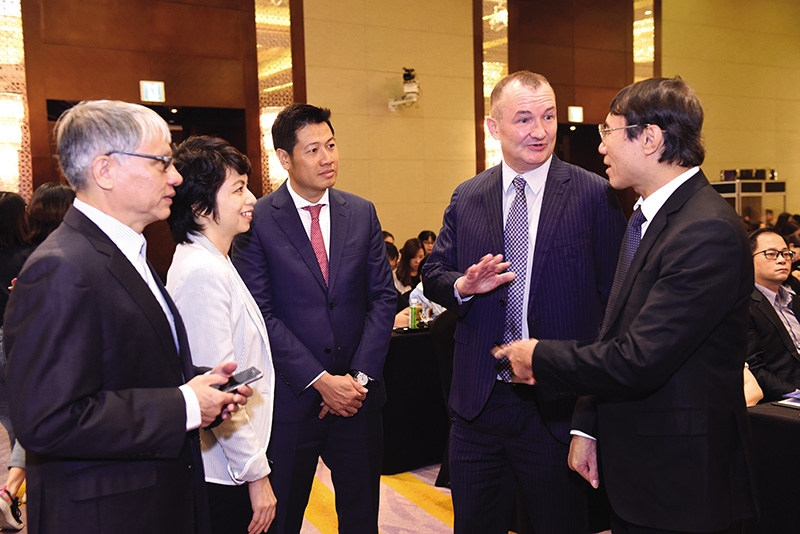Legal series lays focus on tax scene
 |
| KPMG held the Vietnam Tax and Legal Institute 2019 series as an information exchange |
The KPMG Vietnam Tax and Legal Institute 2019, an annual series from global leading consulting firm KPMG, was held in Ho Chi Minh City, Hanoi, and Danang. It provided attendees with an influx of information related to taxation on digital services, cross-border business transactions, development of base erosion and profit shifting (BEPS) application of electronic invoices, highlight of potential tax law changes, and update on treatments for corporate income tax, VAT, and foreign contractor tax.
According to Warrick Cleine, CEO and chairman of KPMG in Vietnam and Cambodia, the outlook for Vietnam’s economy remains sound, aided by its diversified trade structure and Vietnamese policymakers’ commitment to macro-economic stability. However, public resentment recently has arisen over companies that enjoy plenty of benefits without paying their fair share in tax.
“Vietnam has a tax system characterised by low and stable rates, and a special tax incentive regime in a bid to lure overseas capital, but in this digital age, the country needs to undergo tax reform because the allocation of taxing rights can no longer be based on the physical presence,” said Cleine.
Commenting on taxation for multinational digital services and e-commerce, Nguyen Van Phung, director of the Large Enterprise Tax Management Department of the General Department of Taxation, voiced his concerns that “technology businesses pose unprecedented problems” for authorities. “Digitalisation makes it hard to determine the location of the firms’ activity, while globalisation has made it easy for them to establish operations in jurisdictions with low tax rates,” said Phung.
On October 9, the OECD proposed a shake-up of corporate taxation which is aimed at extracting more tax from multinationals whether they are digital or are profitable under intangible brands, such as Google, Facebook, and Netflix.
Experts believe that frontier and emerging markets would gain taxing rights over these firms. However, it remains difficult to reach an intergovernmental approach for taxation. Some countries have decided to go alone in this bid, such as France’s plan of a 3 per cent charge on turnover to firms with revenues of more than $845 million globally.
“The dispute over a tech tax has become a defining clash for all nations, but I believe that Vietnam, with its commitment to follow the actions of the OECD’s framework on BEPS, would harmonise tax systems and ensure all businesses, tech or non-tech, will have a clear and transparent tax landscape,” Cleine expressed.
Phung added, “In fact, Vietnamese authorities are building two data banks dedicated to taxpayer information and invoice data. All of this data, which is merely used for the purpose of tax administration, would be encrypted to prevent fraudulent cases.”
At the event, Ha Do, senior office partner of KPMG’s Hanoi Office, highlighted the latest tax and legal updates related to foreign-invested enterprises (FIEs).
“Non-resident e-commerce firms that don’t have a permanent establishment in Vietnam are obliged to register, declare, and pay tax in Vietnam or authorise other parties to do so on their behalf,” said Ha.
Ha also cited the view of the Ministry of Finance that a VAT refund should be applied to all qualified investment projects, including expansion and new investment projects in the same or different provinces.
In terms of several changes in foreign exchange control of foreign direct investment (FDI) activities into Vietnam, KPMG’s legal partner Bui Thi Thanh Ngoc emphasised that companies established by overseas investors to implement private-public partnership projects are required to have a direct investment capital account.
“Nevertheless, if those businesses are being listed on the Vietnamese bourse, they are obligated to close their direct investment capital account and open an indirect one,” Ngoc said. “Transactions between non-Vietnamese investors via merger and acquisition deals could be in a foreign currency.”
The KPMG Tax and Legal Institute is the consulting firm’s annual flagship seminar series in Vietnam and open to all businesses across the country.
Hoang Manh Hung, Maruichi Sun Steel’s chief accountant, who attended this year’s event, told VIR that his company is 100 per cent Japanese-invested, so tax incentives for FDI in Vietnam is an area of concern that matters most.
“The tax systems in Japan and Vietnam are different, so we are a bit confused whether or not to widen our business activities. We chose KPMG as a reputable consulting firm and a trusted advisor,” Hung said. “KPMG’s advice has helped us shape our business plans which has enhanced our performance. Thanks to this seminar, I can understand more about how the tax system works for FIEs like us.”
What the stars mean:
★ Poor ★ ★ Promising ★★★ Good ★★★★ Very good ★★★★★ Exceptional
Related Contents
Latest News
More News
- KPMG launches tariff modeller in Vietnam to navigate US tariff risks (July 29, 2025 | 12:11)
- Removing hidden barriers to unlock ASEAN trade (June 29, 2025 | 11:31)
- New report charts path for Vietnam’s clinical trial growth (May 21, 2025 | 08:58)
- TTC Agris strengthens market position with investment in Bien Hoa Consumer JSC (May 19, 2025 | 10:14)
- World Bank to help SBV build shared database for banking industry (April 09, 2025 | 08:55)
- New trade alliances and investment hubs are redefining global power dynamics (April 03, 2025 | 17:00)
- ACCA and KPMG forge path for business leaders to pioneer ESG excellence (March 07, 2025 | 10:09)
- VietBank signs MoU with KPMG (February 26, 2025 | 18:47)
- Warrick Cleine MBE: an honour for services to British trade and investment in Vietnam (December 31, 2024 | 20:16)
- KPMG report offers fresh insight into leveraging AI (December 24, 2024 | 09:23)

 Tag:
Tag:




















 Mobile Version
Mobile Version